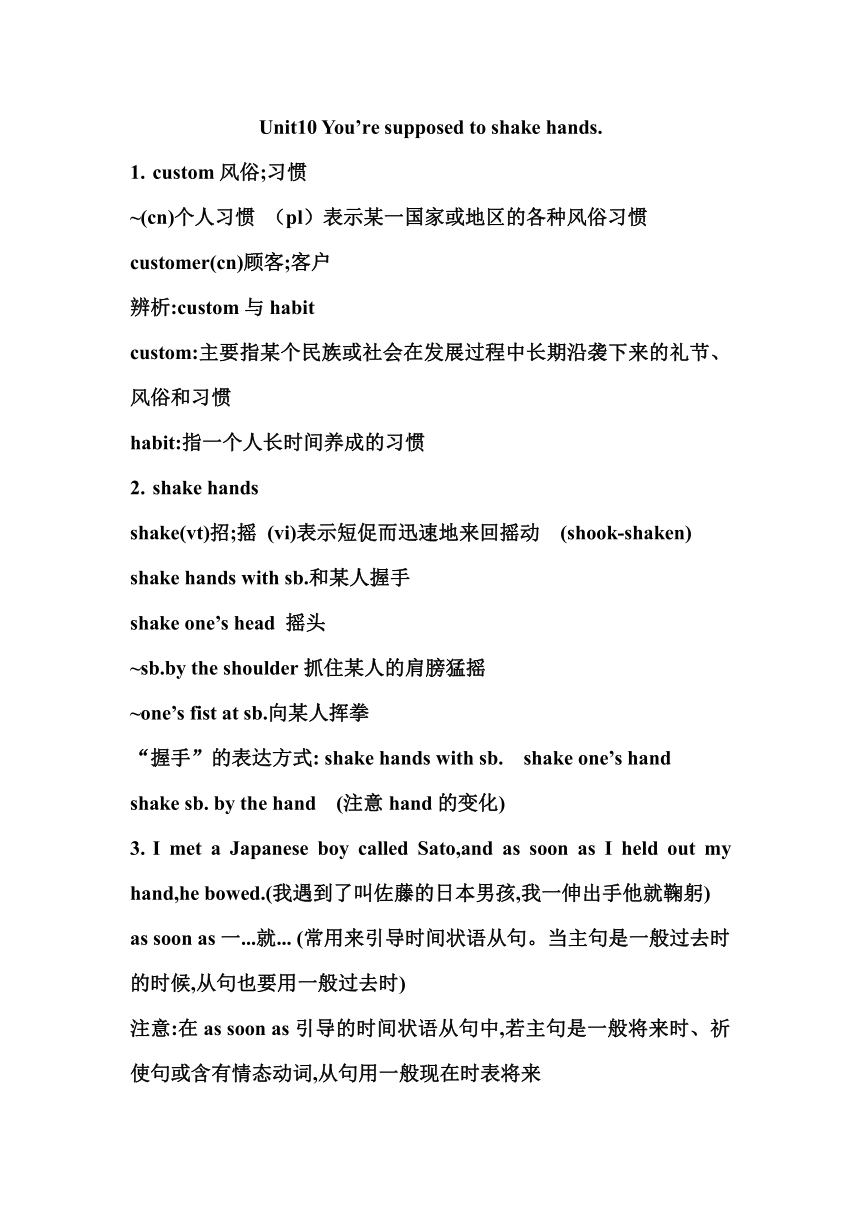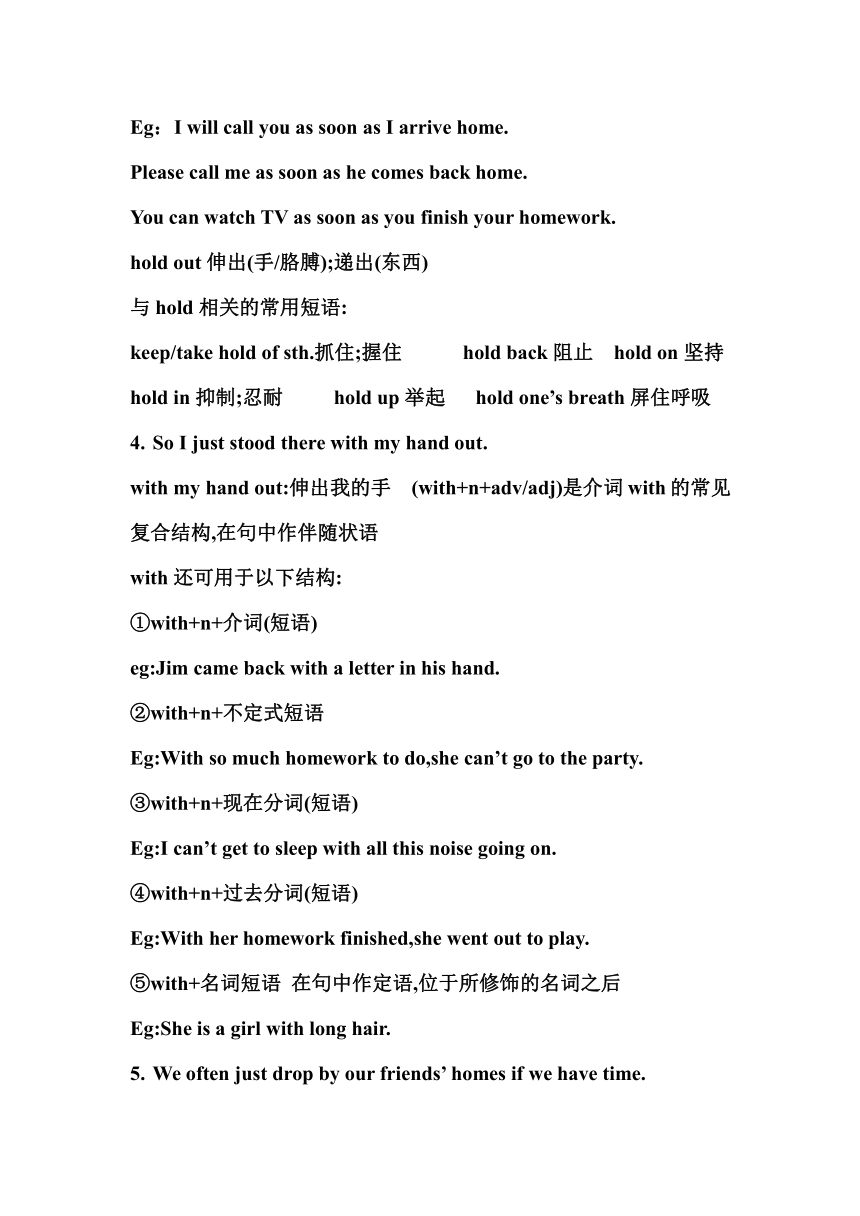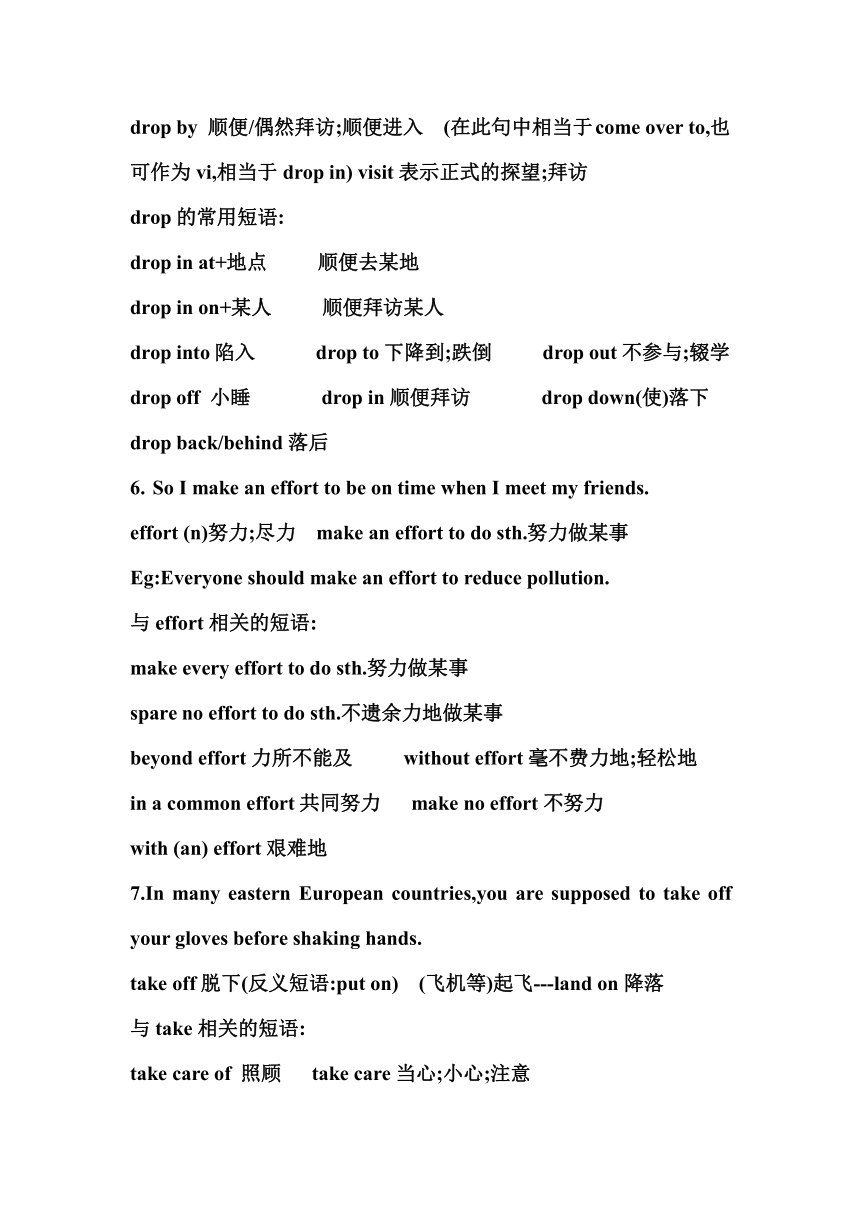Unit10 How can we become good learners知识点讲义 人教版英语九年级全册
文档属性
| 名称 | Unit10 How can we become good learners知识点讲义 人教版英语九年级全册 |  | |
| 格式 | docx | ||
| 文件大小 | 23.2KB | ||
| 资源类型 | 教案 | ||
| 版本资源 | 人教新目标(Go for it)版 | ||
| 科目 | 英语 | ||
| 更新时间 | 2024-01-11 21:34:58 | ||
图片预览




文档简介
Unit10 You’re supposed to shake hands.
custom风俗;习惯
~(cn)个人习惯 (pl)表示某一国家或地区的各种风俗习惯
customer(cn)顾客;客户
辨析:custom与habit
custom:主要指某个民族或社会在发展过程中长期沿袭下来的礼节、风俗和习惯
habit:指一个人长时间养成的习惯
shake hands
shake(vt)招;摇 (vi)表示短促而迅速地来回摇动 (shook-shaken)
shake hands with sb.和某人握手
shake one’s head 摇头
~sb.by the shoulder抓住某人的肩膀猛摇
~one’s fist at sb.向某人挥拳
“握手”的表达方式: shake hands with sb. shake one’s hand
shake sb. by the hand (注意hand的变化)
I met a Japanese boy called Sato,and as soon as I held out my hand,he bowed.(我遇到了叫佐藤的日本男孩,我一伸出手他就鞠躬)
as soon as一...就... (常用来引导时间状语从句。当主句是一般过去时的时候,从句也要用一般过去时)
注意:在as soon as引导的时间状语从句中,若主句是一般将来时、祈使句或含有情态动词,从句用一般现在时表将来
Eg:I will call you as soon as I arrive home.
Please call me as soon as he comes back home.
You can watch TV as soon as you finish your homework.
hold out伸出(手/胳膊);递出(东西)
与hold相关的常用短语:
keep/take hold of sth.抓住;握住 hold back阻止 hold on坚持
hold in抑制;忍耐 hold up举起 hold one’s breath屏住呼吸
So I just stood there with my hand out.
with my hand out:伸出我的手 (with+n+adv/adj)是介词with的常见复合结构,在句中作伴随状语
with还可用于以下结构:
①with+n+介词(短语)
eg:Jim came back with a letter in his hand.
②with+n+不定式短语
Eg:With so much homework to do,she can’t go to the party.
③with+n+现在分词(短语)
Eg:I can’t get to sleep with all this noise going on.
④with+n+过去分词(短语)
Eg:With her homework finished,she went out to play.
⑤with+名词短语 在句中作定语,位于所修饰的名词之后
Eg:She is a girl with long hair.
We often just drop by our friends’ homes if we have time.
drop by 顺便/偶然拜访;顺便进入 (在此句中相当于come over to,也可作为vi,相当于drop in) visit表示正式的探望;拜访
drop的常用短语:
drop in at+地点 顺便去某地
drop in on+某人 顺便拜访某人
drop into陷入 drop to下降到;跌倒 drop out不参与;辍学
drop off 小睡 drop in顺便拜访 drop down(使)落下
drop back/behind落后
So I make an effort to be on time when I meet my friends.
effort (n)努力;尽力 make an effort to do sth.努力做某事
Eg:Everyone should make an effort to reduce pollution.
与effort相关的短语:
make every effort to do sth.努力做某事
spare no effort to do sth.不遗余力地做某事
beyond effort力所不能及 without effort毫不费力地;轻松地
in a common effort共同努力 make no effort不努力
with (an) effort艰难地
7.In many eastern European countries,you are supposed to take off your gloves before shaking hands.
take off脱下(反义短语:put on) (飞机等)起飞---land on降落
与take相关的短语:
take care of 照顾 take care当心;小心;注意
take place 发生 take photos照相
take away拿走 take out(of...)(从...里)拿出;取出
~ after与...想象 ~...to... 把...带到...
~it easy别紧张 ~notes记笔记
~turns轮流 ~down拿下;取下
~over接管;接任 ~part in 参加
8....but it is worth the trouble if you want to understand another culture.
worth(adj)值得;有...价值
其用法如下:
①be worth doing 值得做 (句子的主语一般是do的宾语)
Eg:The place is worth visiting.
②be worth+money 值多少钱
Eg:The picture is worth $300.
③be worth+n 值得...
Eg:I don’t think it’s worth our work.我觉得这件事情不值得我们付出劳动.
注意:worth前面可用well,really,hardly,easily等修饰,但不可用very修饰, “很值得” “well worth”
Eg:The book is well worth reading.
point at anyone with your chopsticks
辨析:point at与point to
point at:习惯上表示指向离说话人较近的事物,意为:指着 (at着重与指的对象)
Eg:The teacher pointed at the blackboard and said, “You must look carefully.”
point to:多用来表示指向离说话人较远的事物,意为:指向 (to着重指的方向)
Eg: He pointed to the house on the other side of the river and said, “That’s my home.”
Yes,I’m having a great time on my student exchange program in France.
exchange(n)交换;互换 in exchange of交换
exchange(vt)交换;兑换;交易
exchange...for...用...来换... exchange sth. with sb.和某人交换某物
Eg: We exchanged our opinions about the game before the meeting.
We exchange gifts with each other at Christmas.
change(v)交换 change sth. with sb.和某人交换某物
Eg: Can I change seats with you
They go out of their way to make me feel at home.他们竭力使我感到宾至如归.
go out of one’s way to do 特意(不怕麻烦)做某事;想尽办法做某事
(try to do sth.)
Eg:He went out of his way to help me.
make sb.feel at home 使某人感到宾至如归
make oneself at home别客气;别拘束;就像在家里一样
Another example is that you’re not supposed to eat anything with your hands except bread,not even fruit.另一个例子是除了面包之外,你不应该用手吃任何东西,甚至水果也不例外
辨析:except,besides,but与except for
except:除去;除了 (其后的宾语不包括在内)
Eg:They went to Beijing except me.
besides:除...之外(另外还有) (其后的宾语包括在内)
Eg:They went to Beijing besides me.
but:与except同义,意为:除了 通常与all,every,who,nothing,nobody等词连用
Eg:There is nobody here but me.
except for:除了...之外(指除去整体中的一个细节,前后内容不是同一类)
Eg:Your English essay is excellent except for some spelling mistakes.
Let me give you some suggestions and advice about Chinese customs.
suggest(v)建议 ~doing sth./~sb. doing sth.建议做某事
辨析:advice与suggestion
advice:(un)泛指:意见;建议
常用短语:follow/accept/take one’s advice接受某人的意见
give sb. advice on 给某人提供有关...的建议
ask for sb’s advice向某人征求建议 a piece of advice一条建议
suggestion:(cn)建议 比advice婉转客气,着重指为了改进或解决问题而提出的办法 make a suggestion 提意见或建议
辨析:be supposed to do sth.与be expected to do sth.
be supposed to do sth.应该做某事 (should/ought (to) do sth.)
be expected to do sth.应该做某事;被期望做某事
用法:二者都用来表示根据规定或传统习惯.人们不得不做某事或期待发生某事,可进行互换
注意:
①当be supposed to...的主语是人时,意为:应该;被期望 可以用来表示劝告、建议、义务、责任等 相当于should
Eg:You’re supposed to ask the teacher if you want to leave the classroom.
②当be supposed to...的主语是物时,意为:本应;本该 表示某事本应该发生而没有发生
Eg:The meeting is supposed to take place on Tuesday,but we put it off.
③was/were supposed to do sth. 相当于should have done sth. 表示(过去)本应该做某事而实际上并没有
Eg:You were supposed to arrive here at 6:00
④be supposed to... 被认为...;被相信是...
Eg:They are supposed to be very clever.
This house is supposed to be his.
⑤be supposed to... 的否定结构为be not supposed to... 它常用于口语中,意为:不被许可...;不应当...
Eg:You are not supposed to do that.
custom风俗;习惯
~(cn)个人习惯 (pl)表示某一国家或地区的各种风俗习惯
customer(cn)顾客;客户
辨析:custom与habit
custom:主要指某个民族或社会在发展过程中长期沿袭下来的礼节、风俗和习惯
habit:指一个人长时间养成的习惯
shake hands
shake(vt)招;摇 (vi)表示短促而迅速地来回摇动 (shook-shaken)
shake hands with sb.和某人握手
shake one’s head 摇头
~sb.by the shoulder抓住某人的肩膀猛摇
~one’s fist at sb.向某人挥拳
“握手”的表达方式: shake hands with sb. shake one’s hand
shake sb. by the hand (注意hand的变化)
I met a Japanese boy called Sato,and as soon as I held out my hand,he bowed.(我遇到了叫佐藤的日本男孩,我一伸出手他就鞠躬)
as soon as一...就... (常用来引导时间状语从句。当主句是一般过去时的时候,从句也要用一般过去时)
注意:在as soon as引导的时间状语从句中,若主句是一般将来时、祈使句或含有情态动词,从句用一般现在时表将来
Eg:I will call you as soon as I arrive home.
Please call me as soon as he comes back home.
You can watch TV as soon as you finish your homework.
hold out伸出(手/胳膊);递出(东西)
与hold相关的常用短语:
keep/take hold of sth.抓住;握住 hold back阻止 hold on坚持
hold in抑制;忍耐 hold up举起 hold one’s breath屏住呼吸
So I just stood there with my hand out.
with my hand out:伸出我的手 (with+n+adv/adj)是介词with的常见复合结构,在句中作伴随状语
with还可用于以下结构:
①with+n+介词(短语)
eg:Jim came back with a letter in his hand.
②with+n+不定式短语
Eg:With so much homework to do,she can’t go to the party.
③with+n+现在分词(短语)
Eg:I can’t get to sleep with all this noise going on.
④with+n+过去分词(短语)
Eg:With her homework finished,she went out to play.
⑤with+名词短语 在句中作定语,位于所修饰的名词之后
Eg:She is a girl with long hair.
We often just drop by our friends’ homes if we have time.
drop by 顺便/偶然拜访;顺便进入 (在此句中相当于come over to,也可作为vi,相当于drop in) visit表示正式的探望;拜访
drop的常用短语:
drop in at+地点 顺便去某地
drop in on+某人 顺便拜访某人
drop into陷入 drop to下降到;跌倒 drop out不参与;辍学
drop off 小睡 drop in顺便拜访 drop down(使)落下
drop back/behind落后
So I make an effort to be on time when I meet my friends.
effort (n)努力;尽力 make an effort to do sth.努力做某事
Eg:Everyone should make an effort to reduce pollution.
与effort相关的短语:
make every effort to do sth.努力做某事
spare no effort to do sth.不遗余力地做某事
beyond effort力所不能及 without effort毫不费力地;轻松地
in a common effort共同努力 make no effort不努力
with (an) effort艰难地
7.In many eastern European countries,you are supposed to take off your gloves before shaking hands.
take off脱下(反义短语:put on) (飞机等)起飞---land on降落
与take相关的短语:
take care of 照顾 take care当心;小心;注意
take place 发生 take photos照相
take away拿走 take out(of...)(从...里)拿出;取出
~ after与...想象 ~...to... 把...带到...
~it easy别紧张 ~notes记笔记
~turns轮流 ~down拿下;取下
~over接管;接任 ~part in 参加
8....but it is worth the trouble if you want to understand another culture.
worth(adj)值得;有...价值
其用法如下:
①be worth doing 值得做 (句子的主语一般是do的宾语)
Eg:The place is worth visiting.
②be worth+money 值多少钱
Eg:The picture is worth $300.
③be worth+n 值得...
Eg:I don’t think it’s worth our work.我觉得这件事情不值得我们付出劳动.
注意:worth前面可用well,really,hardly,easily等修饰,但不可用very修饰, “很值得” “well worth”
Eg:The book is well worth reading.
point at anyone with your chopsticks
辨析:point at与point to
point at:习惯上表示指向离说话人较近的事物,意为:指着 (at着重与指的对象)
Eg:The teacher pointed at the blackboard and said, “You must look carefully.”
point to:多用来表示指向离说话人较远的事物,意为:指向 (to着重指的方向)
Eg: He pointed to the house on the other side of the river and said, “That’s my home.”
Yes,I’m having a great time on my student exchange program in France.
exchange(n)交换;互换 in exchange of交换
exchange(vt)交换;兑换;交易
exchange...for...用...来换... exchange sth. with sb.和某人交换某物
Eg: We exchanged our opinions about the game before the meeting.
We exchange gifts with each other at Christmas.
change(v)交换 change sth. with sb.和某人交换某物
Eg: Can I change seats with you
They go out of their way to make me feel at home.他们竭力使我感到宾至如归.
go out of one’s way to do 特意(不怕麻烦)做某事;想尽办法做某事
(try to do sth.)
Eg:He went out of his way to help me.
make sb.feel at home 使某人感到宾至如归
make oneself at home别客气;别拘束;就像在家里一样
Another example is that you’re not supposed to eat anything with your hands except bread,not even fruit.另一个例子是除了面包之外,你不应该用手吃任何东西,甚至水果也不例外
辨析:except,besides,but与except for
except:除去;除了 (其后的宾语不包括在内)
Eg:They went to Beijing except me.
besides:除...之外(另外还有) (其后的宾语包括在内)
Eg:They went to Beijing besides me.
but:与except同义,意为:除了 通常与all,every,who,nothing,nobody等词连用
Eg:There is nobody here but me.
except for:除了...之外(指除去整体中的一个细节,前后内容不是同一类)
Eg:Your English essay is excellent except for some spelling mistakes.
Let me give you some suggestions and advice about Chinese customs.
suggest(v)建议 ~doing sth./~sb. doing sth.建议做某事
辨析:advice与suggestion
advice:(un)泛指:意见;建议
常用短语:follow/accept/take one’s advice接受某人的意见
give sb. advice on 给某人提供有关...的建议
ask for sb’s advice向某人征求建议 a piece of advice一条建议
suggestion:(cn)建议 比advice婉转客气,着重指为了改进或解决问题而提出的办法 make a suggestion 提意见或建议
辨析:be supposed to do sth.与be expected to do sth.
be supposed to do sth.应该做某事 (should/ought (to) do sth.)
be expected to do sth.应该做某事;被期望做某事
用法:二者都用来表示根据规定或传统习惯.人们不得不做某事或期待发生某事,可进行互换
注意:
①当be supposed to...的主语是人时,意为:应该;被期望 可以用来表示劝告、建议、义务、责任等 相当于should
Eg:You’re supposed to ask the teacher if you want to leave the classroom.
②当be supposed to...的主语是物时,意为:本应;本该 表示某事本应该发生而没有发生
Eg:The meeting is supposed to take place on Tuesday,but we put it off.
③was/were supposed to do sth. 相当于should have done sth. 表示(过去)本应该做某事而实际上并没有
Eg:You were supposed to arrive here at 6:00
④be supposed to... 被认为...;被相信是...
Eg:They are supposed to be very clever.
This house is supposed to be his.
⑤be supposed to... 的否定结构为be not supposed to... 它常用于口语中,意为:不被许可...;不应当...
Eg:You are not supposed to do that.
同课章节目录
- Unit 1 How can we become good learners.
- Section A
- Section B
- Unit 2 I think that mooncakes are delicious!
- Section A
- Section B
- Unit 3 Could you please tell me where the restroom
- Section A
- Section B
- Unit 4 I used to be afraid of the dark.
- Section A
- Section B
- Unit 5 What are the shirts made of?
- Section A
- Section B
- Review of Units 1-5
- Unit 6 When was it invented?
- Section A
- Section B
- Unit 7 Teenagers should be allowed to choose their
- Section A
- Section B
- Unit 8 It must belong to Carla.
- Section A
- Section B
- Unit 9 I like music that I can dance to.
- Section A
- Section B
- Unit 10 You're supposed to shake hands.
- Section A
- Section B
- Review of Units 6-10
- Unit 11 Sad movies make me cry.
- Section A
- Section B
- Unit 12 Life is full of the unexpected
- Section A
- Section B
- Unit 13 We're trying to save the earth!
- Section A
- Section B
- Unit 14 I remember meeting all of you in Grade 7.
- Section A
- Section B
- Review of Units 11-14
